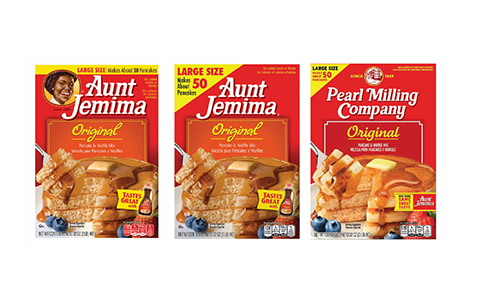Feb 27, 2023
Researchers bring attention to rebranding addressing racism
Recent research coauthored by a Gies Business professor is exploring how consumers respond when a company changes its brand name and packaging to address racism, highlighting the need for further exploration and conversation.
Companies with well-known brands rarely change the images on their packaging – much less their brand name. But in 2020, after the murder of George Floyd and with a renewed national focus on racism, many companies with brand names and images associated with racism took that step.
Researchers sought to measure consumer responses to such changes in a recent study published by PLOS ONE, specifically focusing on PepsiCo’s decision to transition the Aunt Jemima brand to Pearl Milling Company.
“When companies change the look or name of their brand, they risk losing brand equity and brand recognition,” said Maria Kalaitzandonakes, PhD candidate in Agricultural and Consumer Economics and lead author of the study. “But sometimes, a big change, like a merger or acquisition – or in this case, a desire to distance itself from racism – pushes a company to make a change.”
Brand recognition is a powerful tool for both marketers and consumers. Marketers strive to achieve it, and consumers rely on it nearly every time they shop to speed up their decision-making process.

“Brand recognition is where the game starts in terms of the purchase journey,” said Tiffany White (left), associate professor of business administration and Bruce and Anne Strohm Faculty Fellow in Gies College of Business. “If you don’t know what a particular brand is, then of course it’s not in your consideration set, so you have to learn new information, and you’re not necessarily motivated to do that.”
Kalaitzandonakes and White collaborated with Brenna Ellison, associate professor at Purdue University, to evaluate consumer responses to the rebranding of a popular pancake mix – to see how changes addressing racism impacted consumer behavior.
In 2020 and 2021, PepsiCo removed the image of Aunt Jemima from pancake mix packaging and eventually changed the name of the brand to Pearl Milling Company. This two-step process allowed the research team to study the impact of the incremental changes.
Using an online survey, they asked participants about their likelihood of purchase, expected taste, brand liking, and brand trust before and after seeing the change. They randomly assigned participants to one of six groups – divided by extent of change (image removal only or image removal plus name change) and by reason (information about racism, racism and donation information, or alternative information).
The findings showed that only removing the image from the packaging decreased likelihood of purchase by 8 percent, and changing the name in addition to removing the image decreased likelihood of purchase by 32 percent. Explaining that the change was made to address racism didn’t have a significant impact when it came to image removal, but with the name change, it partially buffered the loss.

Image removal alone didn’t lead to significant changes in brand liking or brand trust, but changing the brand name led to decreases in both liking and trust. And both changes led to losses in expected taste, suggesting consumers may think the new branding affects the quality of the product in some way.
“What it shows is that when you make a change, it comes with these corresponding attributions from consumers, where they’re going to fill in some of their own blanks,” White said. “Consumers go down this path of reasoning that you might not have intended. That’s something for brands to think about, and to the extent that you think about it, you can be more strategic in managing it.”
The research also found that results differed across political ideology. Drops in likelihood of purchase were larger for conservative and moderate consumers than for liberal consumers. Additionally, information about racism helped mitigate reactions for liberal consumers but had the opposite impact on conservative consumers.
Overall, the researchers see this work as a chance for both marketers and consumers to think more deeply about these changes.
“In general, there’s an increasing desire to see companies do good,” Kalaitzandonakes said. “There isn’t always consensus on what ‘good’ is, but there is a desire for companies to behave in ethical ways, and sometimes there is tension for companies when these goals don’t align with profitability. Studies like this one can play an important role in highlighting this tension and trying to help figure out solutions.”
When there’s a chance for consumers to come to their own conclusions – like thinking the taste or quality of the product may have changed – White hopes this research can help marketers start thinking of ways to mitigate those reactions. And when it comes to consumers, White thinks this research might make them more aware of these changes when shopping.
“I think this kind of news and newsworthiness is something that gets consumers talking and thinking about things they might not otherwise have thought about,” White said. “Being a part of the conversation that shows that firms with good intentions are not getting the benefits might actually get people interested in supporting those businesses.”
